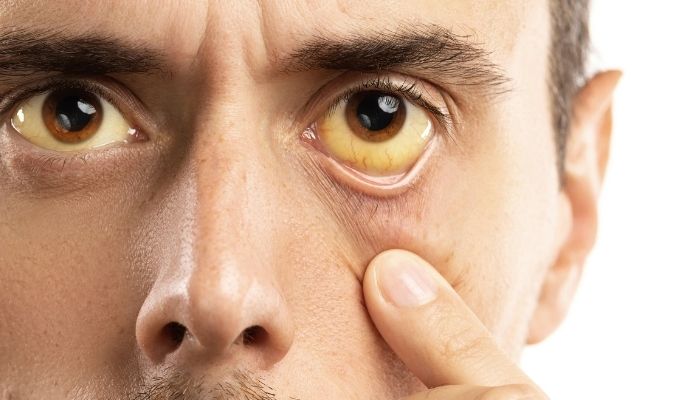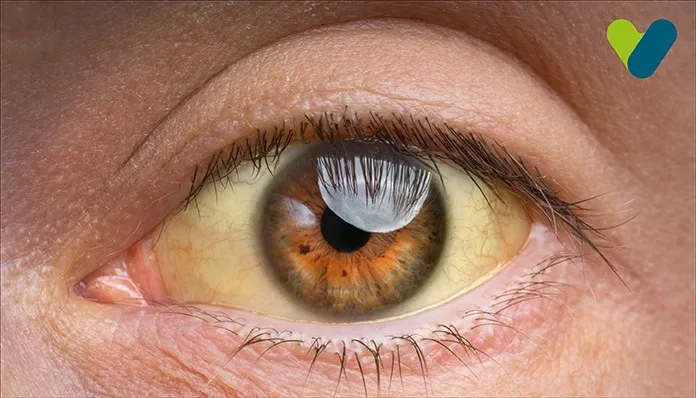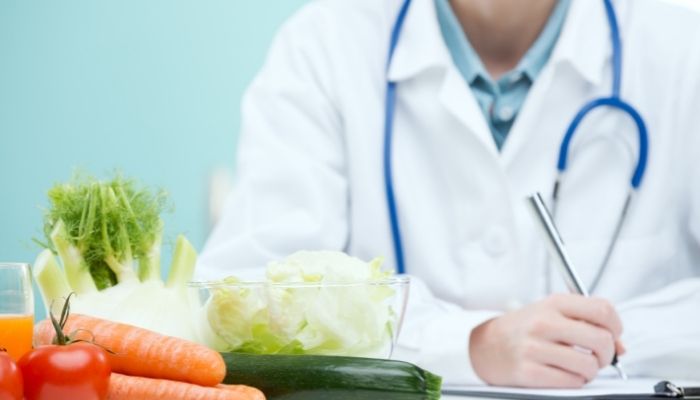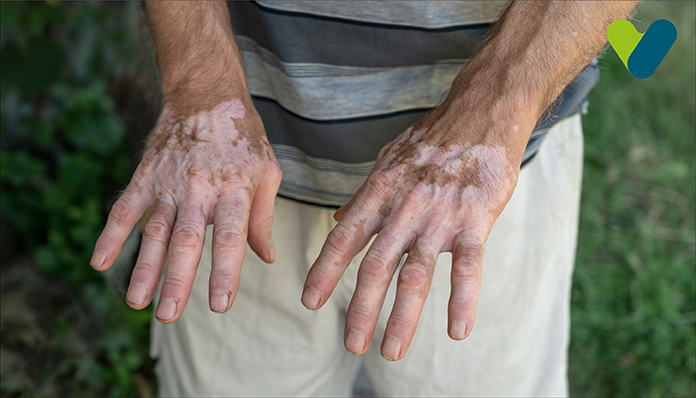Manshi (23-years-old) is a free-spirited and vivacious girl who works in a private company. Manshi loves to lead her life to the full extent. Over the past few days, Manshi experienced some abdominal pain and continuous fullness. Initially, she thought it could be some normal gastrointestinal problems, so she ignored them. But suddenly, she noticed some changes in skin and eye color. While consulting a doctor, she came to know that she was suffering from jaundice for the past few days. The doctor prescribed some medications and advised her to follow a special diet chart for jaundice patients that will speed up her recovery.

Manshi has started taking medications along with the jaundice diet chart. Now, she is improving and feeling better.
Jaundice Causes
Jaundice is the yellowing of skin and eyes caused due to too much bilirubin in blood. This can happen due to many reasons. Some of the main causes of jaundice are :- Liver Diseases
- Hepatitis: When the liver swells up due to infection, the liver can stop processing bilirubin.
- Cirrhosis: Chronic liver damage can cause scarring which can stop the liver from properly functioning and processing bilirubin.
- Liver Cancer: Tumors can affect liver function and can cause high bilirubin levels
- Bile Duct Blockage
- Gallstones: These can block the bile ducts and prevent bilirubin from being excreted into the intestines and hence bilirubin levels increase in blood.
- Pancreatic Cancer: Tumors in the pancreas can press on the bile ducts and cause them to block.
- Hemolytic Anemia: This is when red blood cells break down too fast and there is too much bilirubin for the liver to process. Conditions like sickle cell anemia or certain infections can cause this.
- Genetic Disorders: Gilbert’s Syndrome: A common benign condition where the liver doesn’t process bilirubin properly and can cause mild jaundice. Crigler-Najjar Syndrome: A rare genetic disorder that severely affects bilirubin metabolism.
- Infections: Certain infections especially those that affect the liver like viral hepatitis or mononucleosis can cause jaundice.
- Alcohol and Drug Use: Excessive alcohol consumption can damage the liver while certain medicines may cause liver toxicity as a side effect and eventually cause jaundice.
- Newborn Jaundice: Many newborns get jaundice shortly after birth due to immature liver function. This usually resolves on its own but sometimes requires treatment.
Knowing the cause of jaundice is important to get a proper jaundice treatment. So if you see any jaundice symptoms and you suspect that you have jaundice it is better to consult a doctor at the earliest.
Jaundice Symptoms
Following are the common symptoms of jaundice:- Yellowing of the Skin and Eyes: This is the most obvious one, due to excess bilirubin in the blood.
- Dark Urine: Urine will be darker than usual due to high bilirubin levels.
- Pale or Clay-Colored Stools: When bilirubin isn’t reaching the intestines.
- Itchy Skin: Elevated bilirubin can cause itching all over.
- Fatigue: General feeling of tiredness or weakness.
- Abdominal Pain: Discomfort or pain in the upper right abdomen especially if related to liver or gallbladder issues.
- Loss of Appetite: Decreased desire to eat.
- Nausea and Vomiting: Some may experience gastrointestinal discomfort.
Jaundice Diet - How Important Is It?
The prime function of your liver is to remove toxins and old, damaged blood cells of the body. When this process is interrupted, a waste product called bilirubin starts to build up. This can lead to jaundice. Your food and drinking habits impact your liver functions directly. Once you start to follow the jaundice diet chart, your liver will work more efficiently and remove excess toxins from your body. This may minimize your risk for future episodes of jaundice. If you are suffering from jaundice, you must discard certain foods that provide the liver with complex chemicals to process.11 Foods to Avoid for Jaundice
What you eat and drink in jaundice can make or break your body. Wondering what to avoid in jaundice? Let’s take a look at the best drinks and foods to avoid in jaundice including:- Processed Foods: Processed Foods contain high amounts of preservatives and unhealthy fats. Preservatives and fats are primarily processed by the liver. Thus eating processed foods while suffering from jaundice can severely affect the liver.
- High Sugar Foods: No list of jaundice foods to avoid is complete without mentioning high sugar foods. Sugar is primarily processed by the liver. Thus consuming high sugar food during jaundice can contribute to liver stress.
- Salt: If you want to get a faster recovery from jaundice, you should restrict your salt intake. If you add salt regularly to your food items, then it may slow down jaundice recovery and might lead to the deterioration of liver cells. Thus, you must avoid salted pickles and certain fish varieties.
- Meat: Next in the list of foods to avoid in jaundice is meat. People who are suffering from jaundice must avoid all types of meat. Meat contains a higher level of saturated fats that slow down the recovery from jaundice. Once you recover completely from jaundice, you can eat meat.
- Dairy Products: Milk products should be discarded if you have jaundice. The common milk products are cheese, butter, buttermilk, curd, and margarine. Were you aware of these jaundice foods to avoid?
- Eggs: Since eggs are high in protein, hence they are difficult to digest. Thus, jaundice patients should stay away from eating eggs.
- Caffeine: When suffering from jaundice, avoid caffeinated drinks like tea and coffee. They may lessen the speed of recovery from jaundice and damage the liver further. No wonder they figure in the list of foods to avoid in jaundice.
- Junk Foods: When anyone thinks about the foods to avoid in jaundice, the first thing that comes to their mind is - Junk food. These are the most perilous food items that you should avoid if suffering from jaundice. They possess more amounts of oil, fat, and other adulterated materials that worsen your health.
- Beans: During jaundice, body finds it difficult to excrete nitrogen because the body is busy fighting the condition and cannot perform its metabolic activities. Eating beans will increase the load to the body and the recovery will also get delayed from jaundice.
- Banana: Since bananas are rich in fibre content, thus, you must avoid them when you have jaundice. Bananas employ much pressure on the digestive system and also enhance the level of bilirubin.
- Butter and Clarified Butter: You must avoid these two food items when suffering from jaundice. They are rich in saturated fats, and thus, they are not good for liver health and exert further pressure on the sick body.
- Pulses and Legumes: Surprisingly, the Next item in the list of foods to avoid in jaundice are pulses and legumes. These fibrous food items will put stress on the digestive system and hence should be avoided during jaundice. They also cause decomposition in the lower intestines.
- Avoid Juices: Avoid consuming juices or foods prepared by roadside vendors or even from restaurants. You can prepare fresh juices at your home and then consume them.
- Alcohol : Alcohol can severely damage the liver especially if you are suffering from a liver related disease such as jaundice.
-

If you have jaundice, then don’t eat large meals. Always eat small meals frequently.
What to Eat In Jaundice?
For someone recovering from jaundice, a doctor will devise a treatment plan that includes nutritional suggestions. Fresh fruits, vegetables and dry fruits are high in antioxidants and fibre, which can help prevent liver damage and improve digestion. The suggestions will vary depending on the severity of the case and any underlying medical conditions.Best Foods To Eat In Jaundice
Here is the list of foods and drinks you should include in your jaundice diet plan as mentioned below:-- Fresh Fruits and Vegetables
- Coffee and Herbal Tea
- Water
- Milk Thistle
- Whole Grains
- Nuts and Legumes
- Lean Proteins
Best Foods to eat in jaundice:
- Fruits:
- Apples: Doctors suggest patients take apples with their diet because apples are rich in fiber and antioxidants.
- Bananas: Bananas are easy to digest, light on the stomach and have lots of potassium.
- Papaya: Papayas contain enzymes that help in digestion and are gentle on the liver.
- Berries: Berries contain a lot of antioxidants which help in jaundice recovery.
- Vegetables:
- Leafy Greens: Green leafy vegetables such as spinach and kale help liver function better.
- Carrots: Rich in beta-carotene, carrots support liver health.
- Beets: Beetroots detoxify the liver.
- Whole Grains:
- Brown Rice: Brown rice is high in fiber and easy to digest.
- Quinoa: A good source of protein and nutrients.
- Protein Sources:
- Moong Dal (yellow lentils): Gentle on the stomach and easy to digest.
- Tofu: A plant-based protein that is light on the liver.
- Fish: Lean fish (like salmon) can be beneficial if tolerated.
- Healthy Fats:
- Olive Oil: Olive oil contains healthy fat that can help liver function.
- Avocado: Avocado is another source of healthy fats and nutrients.
- Water: Water is the best drink for hydration and can help the liver to process bilirubin.
- Herbal Teas: Herbal tea varieties such as Chamomile, peppermint, and dandelion tea can help in digestion and liver health.
- Coconut Water: Coconut water is the next best source of hydration and is also full of electrolytes.
- Lemon Water: Fresh lemon juice mixed with water can help detoxify the liver.
- Fresh Fruit Juices: Diluted fresh fruit juices like apple juice or orange juice contain vitamins and are a good hydration source. But they must be consumed in moderation because they contain a lot of natural sugar.
Also Read: Treatment of Jaundice and its impact
Jaundice Diet Chart
Following is a sample diet chart for managing jaundice. While designing a jaundice diet chart, focus on hydration, liver-friendly foods, and easy-to-digest items.Breakfast (8.00 a.m. to 8.30 a.m.)
You can start your day with a bowl of vegetable soup like tomato soup, carrot soup, broccoli & witty bell pepper soup, beetroot soup
Mid Meal (11 a.m. to 11.30 a.m.)
You can consume a glass of tender coconut water along with some fruits like grapes, apples, pomegranates, guava, ripe papaya, oranges, chiku, etc. Lunch (2.00 p.m. to 2.30 p.m.)
You can take khichdi (1/2 cup) or chapati (2 pieces) with fish curry or boiled rice (1/2 cup) or tomato uttapam or dosa with sambar
Evening Snacks (4 p.m. to 4.30 p.m.)
A cup of black tea along with boiled potato or boiled black grams or roasted rice flakes could be your ideal choice
Dinner (8 p.m. to 8.30 p.m.)
Khichdi (1/2 cup) or boiled rice with baked pumpkin or bottle gourd curry or boiled rice with fish stew
Tips:
Stay hydrated: Drink enough water and consume herbal teas.
Avoid: Fatty foods, fried items, alcohol, and overly processed snacks.
Eat small, frequent meals to aid digestion.
Personalize your diet chart and make changes according to your preferences and food tolerances.
Consult a doctor before making dietary changes.
Why Should I Drink More Water in Jaundice?
Jaundice patients should drink at least 8 glasses of water every day. Water will wash out more detrimental waste products of the liver (Bilirubin) and keeps the level of bilirubin under check
- You must consume more fresh fruits and vegetables during jaundice
- You should be restricted in consumption of coffee (in a moderate way)
- Milk thistle will boost the recovery process by safeguarding your liver from harmful toxins
- Honey, Pineapple, and Mango: all these contain digestive enzymes
- Fiber-rich vegetables and nuts: Fibers can quickly absorb the bilirubin
Jaundice Diet - The Bottom Line
Jaundice is a disease that is primarily caused by the accumulation of bilirubin in the blood. Even after identifying the root cause, it takes a long time to clear out of your system. A wholesome and balanced jaundice diet will assist your liver to assuage jaundice by preventing its recurrence. Consult General-Physician!References:
- Standard Treatment Workflow (STW) JAUNDICE. ICMR, Department of Health Research Ministry of Health and Family Welfare, Government of India [Internet]. https://www.icmr.gov.in/icmrobject/uploads/STWs/1726567564_jaundice.pdf. Accessed Jan 30, 2022.
- Jaundice in adults. Healthdirect Australia [Internet]. https://www.healthdirect.gov.au/jaundice. Accessed Feb 1, 2022.
- Jaundice Diet: Know What To Eat and What To Avoid From Nutritionist. OnlymyHealth [Internet]. https://www.onlymyhealth.com/indian-diet-for-jaundice-patients-what-to-eat-and-what-to-avoid-1561633896. Accessed Feb 3,2022.
- Liver Disease Diets. American Liver Foundation [Internet]. https://liverfoundation.org/health-and-wellness/healthy-lifestyle/liver-disease-diets/. Accessed Feb 5, 2022.
- Diet For People With Jaundice. Health Online Unit, Ministry of Health Malaysia. http://www.myhealth.gov.my/en/diet-people-jaundice/. Accessed Feb 7, 2022.



